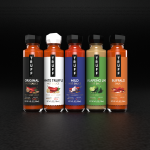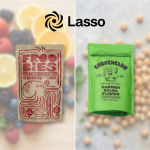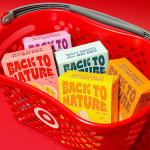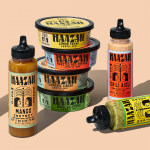A Bite With…Samantha O’Donnell, Punch Edibles And Extracts Co-Founder
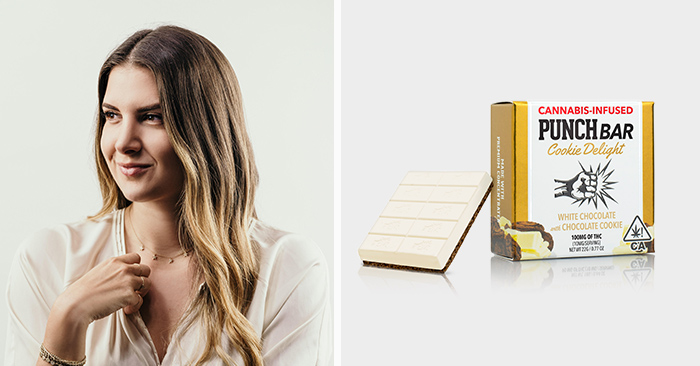
California-based Punch Edibles was founded in 2014 by wife-and-husband team, Samantha and Andrew O’Donnell, in an effort to address the need for more “sensibly sized, high-dose” THC edibles. Initially operating in the medicinal space, the cannabis chocolate company moved into recreational dispensaries when the Golden State legalized adult-use in 2016 and has since broadened its offerings by adding gummies, vaporizers, concentrates, live rosin and pre-rolls, all while expanding its roster of manufacturing clients, like Dr. Norm’s.
When it comes to THC edibles, gummies are still king. In a late 2023 survey by the Brightfield Group, 53% of cannabis consumers reported purchasing gummies within the past six months – up from 44% in early 2020. Cannabis gummy sales were estimated to be worth $2.6 billion in 2023, representing around 8% of all US cannabis sales.
That’s not to say there isn’t room for other categories though. We caught up with Punch co-founder Samantha O’Donnell to reflect on a decade in the cannabis industry, the subtleties of working in multiple markets with different products and the opportunity she sees outside of infused candy, as reflected by last week’s acquisition of Tempo Crackers.
How has Punch evolved with changing consumer demand in dosage and product mix?
When recreational legalization happened in California a lot of other brands tried to join this space because, at the time, it was seen as a greenlight to come into cannabis. We really had to diversify our portfolio. In terms of edibles, we don’t just have chocolates anymore but we make gummies, malt balls and a new product called asteroids. For us, we just recognize that in order to stay as a top brand, you need to be able to diversify your offerings. I think it’s been extremely crucial to us being able to stay in business here.
Thankfully, by the time recreational licensing came out, we were already a tried and trusted brand within California’s medicinal cannabis space and we always prided ourselves on being very professional. We were one of the first to put nutritional facts on the chocolate bar packaging. We’ve always tried to go above and beyond to make it as safe and trusted as possible.
How does operating in different states affect revenue and margins?
The price per liter plays a big role. It depends on how many licenses for growers and processors are in a state; the price to grow in those states and how much raw product is available. If there is enough availability throughout the entire year, then prices tend to not fluctuate as much. When there’s only material available during harvest season there’s more fluctuation in the prices. As a manufacturer, your raw goods having such variables in pricing definitely can affect your overall margin. California has been online for awhile now and so the market has regulated the cost per liter. Oklahoma is still a little all over the place.
What was the attraction to acquiring Tempo Crackers?
Early on, we saw the potential of tapping into the savory market in cannabis. We knew it wasn’t the biggest of categories, but a lot of things that you do in cannabis is a long play. What kind of snacks and edibles do normal consumers eat on a daily basis? It’s chips and crackers. Preparing for a time when cannabis can be nationwide we see the snack category as having the most potential.
Tempo crackers are really one of the first savory edible brands to focus on individual dosing. Each cracker is always dosed individually and even though they’re lower for snackability, you can still choose your dosage based on how many crackers you actually consume. That was something that really set them apart from the beginning.
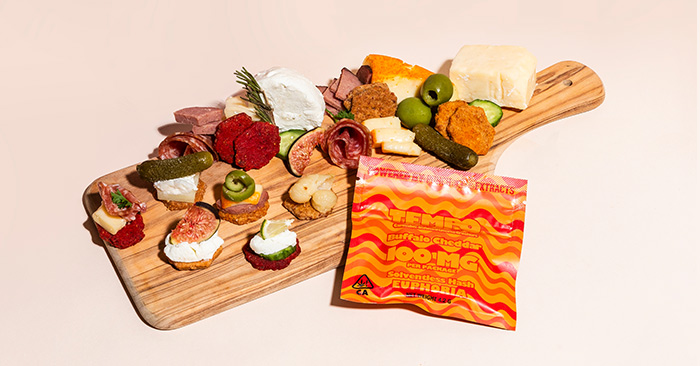
How can more retailers and consumers be drawn into the savory category?
There’s just a lot of education that needs to come along with savory. We still have to fight in a lot of dispensaries to get visibility for customers to see the savory products because if a retailer gives the shelf space to gummies it’s a sure sell. It’s really just about building the brand presence. If we come out with a Tempo gummy, someone might be more willing to try the savory edibles.
In addition, we’re doing a lot of in-store demos and educating potential customers on how to introduce savory into their cannabis-using experience. We just came out with these little pamphlets that do recipes with the crackers, so it’s making it more of a lifestyle choice. Maybe you consume Tempo Crackers with friends over a charcuterie board, maybe you cook with them, maybe you use them in different applications.
Has the momentum behind rescheduling marijuana from a Schedule I to Schedule III drug changed Punch’s growth strategy?
In the last couple of years, there have been a lot of these moments where you think something is gonna happen, and then it kind of gets quiet and disappears. You learn to protect yourself so you don’t get crushed again. Should cannabis be considered one of the most deadly or dangerous drugs? Absolutely not. I think there’s more people that would agree with that than disagree. I’ve always felt like cannabis should be more regulated like alcohol.
You have to take the good with the bad though. If people want to come into this industry, after all these reclassifications I say: Sure, come on in. I welcome the competition. This is a fierce industry and I’ve already got 10 years in it. From a sales and brand perspective, if people want to buy my product and take it where they want to take it because now it’s less of a risk, I get more visibility in other states without having to market on my end.
What’s the biggest potential impact of rescheduling?
The prospect of the tax constraints going away is interesting. If I started a t-shirt company, I could sell across the whole U.S. I could sell internationally and I could deduct whatever I needed for my company off my taxes like any other business.
There’s so many different constraints within cannabis and to add on this extra layer of what you can deduct from your taxes is super confining; especially, when you don’t have access to traditional banking and loans. It makes it very difficult to sustain business. Having 280E potentially go away with rescheduling and having a reduced tax burden provides a higher profit after tax. It would allow us to have more capital to grow, to come out with new products faster and pay off expenses. In that aspect alone, it’s very exciting.


